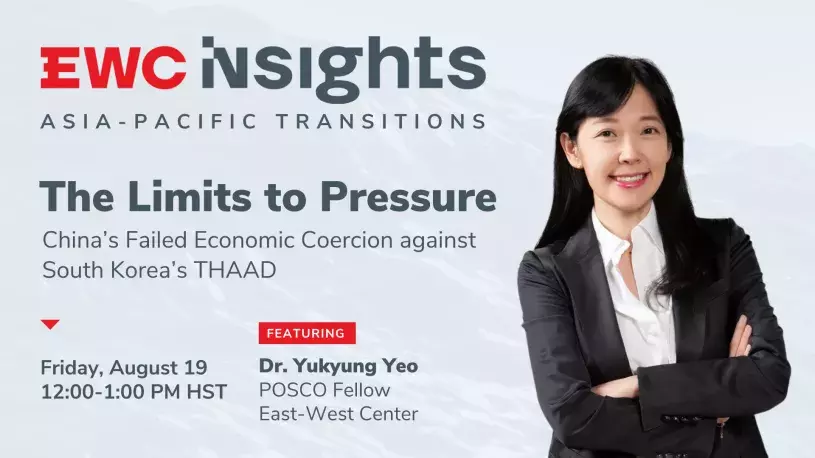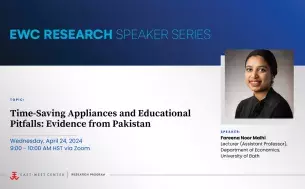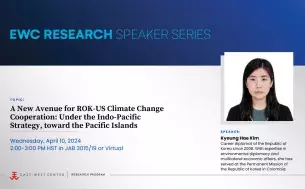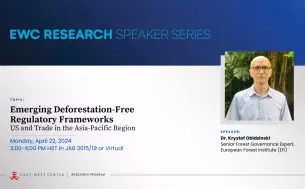Error message

In the context of economic interdependence, South Korea, like other countries with asymmetrical trade relations with China, is often seen by its citizens as vulnerable to China’s use of economic power for political influence. However, South Korea’s deployment of the THAAD (Terminal High Altitude Area Defense) offers the opposite perspective on South Korea’s vulnerability. Despite China’s coercive policies against South Korea’s firms and business, China failed to generate the concession regarding Korea’s decision to deploy the THAAD in the end. The question is why, despite its great leverage over Korea’s economy, China failed to bring about Seoul’s policy change in the THAAD deployment, and hence failed to force Seoul to comply with China’s national and security interests. Drawing on the 2016-17 case of the THAAD crisis between South Korea and China, I argue that the effectiveness of coercive power will depend on the sanctioner’s willingness to bear costs, the target state’s level of stateness, and the relative intensity of interests involved. This case study helps us understand the circumstances under which China’s use of economic coercion against target countries will be more or less successful.
Dr. Yukyung Yeo is a Professor of the College of International Studies at Kyung Hee University. Dr. Yeo is a POSCO Fellow at the East-West Center (July-August 2022), focusing on the subject of China’s economic coercion in East Asia. Before joining the Center, Dr. Yeo was a visiting scholar at the Fairbank Center for Chinese Studies at Harvard University (2021-2022). Dr. Yeo received her Ph.D. from the University of Maryland-College Park in 2007. Before joining Kyung Hee University, she worked at the City University of Hong Kong. Dr. Yeo’s first book, Varieties of State Regulation: How China Regulates Its Socialist Market Economy, was published by Harvard University Press in 2020. Dr. Yeo has published several book chapters and articles in journals such as China Quarterly, Journal of Contemporary China, China Information, Pacific Review, and Korean Journal of International Studies.
Each month, the East-West Center Research Program presents an “EWC Insights” seminar that examines an environmental, demographic, or political and economic transformation reshaping the Asia-Pacific region.
In the context of economic interdependence, South Korea, like other countries with asymmetrical trade relations with China, is often seen by its citizens as vulnerable to China’s use of economic power for political influence. However, South Korea’s deployment of the THAAD (Terminal High Altitude Area Defense) offers the opposite perspective on South Korea’s vulnerability. Despite China’s coercive policies against South Korea’s firms and business, China failed to generate the concession regarding Korea’s decision to deploy the THAAD in the end. The question is why, despite its great leverage over Korea’s economy, China failed to bring about Seoul’s policy change in the THAAD deployment, and hence failed to force Seoul to comply with China’s national and security interests. Drawing on the 2016-17 case of the THAAD crisis between South Korea and China, I argue that the effectiveness of coercive power will depend on the sanctioner’s willingness to bear costs, the target state’s level of stateness, and the relative intensity of interests involved. This case study helps us understand the circumstances under which China’s use of economic coercion against target countries will be more or less successful.
Dr. Yukyung Yeo is a Professor of the College of International Studies at Kyung Hee University. Dr. Yeo is a POSCO Fellow at the East-West Center (July-August 2022), focusing on the subject of China’s economic coercion in East Asia. Before joining the Center, Dr. Yeo was a visiting scholar at the Fairbank Center for Chinese Studies at Harvard University (2021-2022). Dr. Yeo received her Ph.D. from the University of Maryland-College Park in 2007. Before joining Kyung Hee University, she worked at the City University of Hong Kong. Dr. Yeo’s first book, Varieties of State Regulation: How China Regulates Its Socialist Market Economy, was published by Harvard University Press in 2020. Dr. Yeo has published several book chapters and articles in journals such as China Quarterly, Journal of Contemporary China, China Information, Pacific Review, and Korean Journal of International Studies.
Each month, the East-West Center Research Program presents an “EWC Insights” seminar that examines an environmental, demographic, or political and economic transformation reshaping the Asia-Pacific region.









